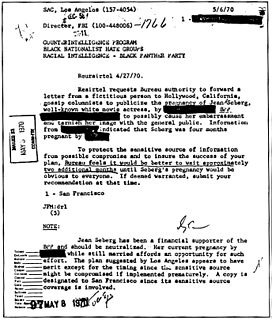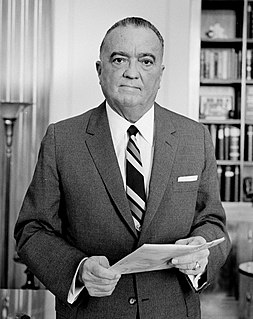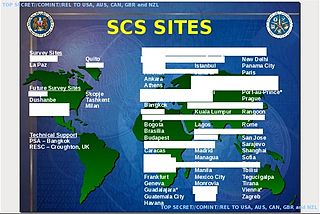Related Research Articles

COINTELPRO (1956–1971) was a series of covert and illegal projects actively conducted by the United States Federal Bureau of Investigation (FBI) aimed at surveilling, infiltrating, discrediting, and disrupting domestic American political organizations. FBI records show COINTELPRO resources targeted groups and individuals the FBI deemed subversive, including feminist organizations, the Communist Party USA, anti–Vietnam War organizers, activists of the civil rights movement and Black Power movement, environmentalist and animal rights organizations, the American Indian Movement (AIM), Chicano and Mexican-American groups like the Brown Berets and the United Farm Workers, independence movements, a variety of organizations that were part of the broader New Left, and far-right groups such as the Ku Klux Klan and the National States' Rights Party.

The Federal Bureau of Investigation (FBI) is the domestic intelligence and security service of the United States and its principal federal law enforcement agency. Operating under the jurisdiction of the United States Department of Justice, the FBI is also a member of the U.S. Intelligence Community and reports to both the Attorney General and the Director of National Intelligence. A leading U.S. counter-terrorism, counterintelligence, and criminal investigative organization, the FBI has jurisdiction over violations of more than 200 categories of federal crimes.

John Edgar Hoover was an American law enforcement administrator who served as the first Director of the Federal Bureau of Investigation (FBI). He was appointed director of the Bureau of Investigation – the FBI's predecessor – in 1924 and was instrumental in founding the FBI in 1935, where he remained director for another 37 years until his death in 1972. Hoover built the FBI into a larger crime-fighting agency than it was at its inception and instituted a number of modernizations to police technology, such as a centralized fingerprint file and forensic laboratories. Hoover also established and expanded a national blacklist, referred to as the FBI Index or Index List.

Jean Dorothy Seberg was an American actress who lived half of her life in France. Her performance in Jean-Luc Godard's 1960 film Breathless immortalized her as an icon of French New Wave cinema.

Robert Philip Hanssen is an American former Federal Bureau of Investigation (FBI) double agent who spied for Soviet and Russian intelligence services against the United States from 1979 to 2001. His espionage was described by the Department of Justice as "possibly the worst intelligence disaster in U.S. history." Hanssen is currently serving 15 consecutive life sentences without parole at ADX Florence, a federal supermax prison near Florence, Colorado.
Earl Edwin Pitts is a former FBI special agent who was convicted of espionage for selling information to Soviet and Russian intelligence services.

Francis James Westbrook Pegler was an American journalist and writer. He was a popular columnist in the 1930s and 1940s famed for his opposition to the New Deal and labor unions. Pegler aimed his pen at presidents of both parties, including Herbert Hoover, FDR ("moosejaw"), Harry Truman, and John F. Kennedy. He also criticized the Supreme Court, the tax system, and corrupt labor unions. In 1962, he lost his contract with King Features Syndicate, owned by the Hearst Corporation, after he started criticizing Hearst executives. His late writing appeared sporadically in publications that included the John Birch Society's American Opinion.

Enemy of the State is a 1998 American political action thriller film directed by Tony Scott, produced by Jerry Bruckheimer and written by David Marconi. The film stars Will Smith and Gene Hackman and features an ensemble supporting cast consisting of Jon Voight, Lisa Bonet, Gabriel Byrne, Dan Butler, Loren Dean, Jack Black, Jake Busey, Barry Pepper, and Regina King. The film tells the story of a group of corrupt National Security Agency (NSA) agents conspiring to kill a congressman and the cover-up that ensues after a tape of the murder ends up in the possession of an unsuspecting lawyer.

Project MINARET was a domestic espionage project operated by the National Security Agency (NSA), which, after intercepting electronic communications that contained the names of predesignated US citizens, passed them to other government law enforcement and intelligence organizations. Intercepted messages were disseminated to the FBI, CIA, Secret Service, Bureau of Narcotics and Dangerous Drugs (BNDD), and the Department of Defense. The project was a sister project to Project SHAMROCK.

The Citizens' Commission to Investigate the FBI was an activist group operational in the US during the early 1970s. Their only known action was breaking into a two-man Media, Pennsylvania, office of the Federal Bureau of Investigation (FBI) and stealing over 1,000 classified documents. They then mailed these documents anonymously to several US newspapers to expose numerous illegal FBI operations which were infringing on the First Amendment rights of American civilians. Most news outlets initially refused to publish the information, saying it related to ongoing operations and that disclosure might have threatened the lives of agents or informants. However, The Washington Post, after affirming the veracity of the files which the Commission sent them, ran a front-page story on March 24, 1971, at which point other media organizations followed suit.
Athan George Theoharis was an American historian, professor of history at Marquette University in Milwaukee, Wisconsin. As well as his extensive teaching career, he was noteworthy as an expert on the Federal Bureau of Investigation (FBI), J. Edgar Hoover, and U.S. intelligence agencies, having written and edited many books on these and related subjects.

The Special Collection Service (SCS), codenamed F6, is a highly classified joint U.S. Central Intelligence Agency–National Security Agency program charged with inserting eavesdropping equipment in difficult-to-reach places, such as foreign embassies, communications centers, and foreign government installations. Established in the late 1970s and headquartered in Beltsville, Maryland, the SCS has been involved in operations ranging from the Cold War to the Global War on Terrorism.

"Stellar Wind" was the code name of a warrantless surveillance program begun under the George W. Bush administration's President's Surveillance Program (PSP). The National Security Agency (NSA) program was approved by President Bush shortly after the September 11, 2001 attacks and was revealed by Thomas Tamm to The New York Times in 2004. Stellar Wind was a prelude to new legal structures that allowed President Bush and President Barack Obama to reproduce each of those programs and expand their reach.

The Private Files of J. Edgar Hoover is a 1977 American biographical drama film written, produced, and directed by Larry Cohen. It stars Broderick Crawford as Hoover, alongside an ensemble cast including Jose Ferrer, Michael Parks, Rip Torn, James Wainwright, Celeste Holm, Ronee Blakely, John Marley, Michael Sacks, Brad Dexter, Tanya Roberts and in final screen appearances, Jack Cassidy and Dan Dailey. Both Cassidy and Dailey met with then First Lady Betty Ford and helped director Cohen get permission to film in Washington, D.C., in locales where the real Hoover visited or worked.

PRISM is a code name for a program under which the United States National Security Agency (NSA) collects internet communications from various U.S. internet companies. The program is also known by the SIGAD US-984XN. PRISM collects stored internet communications based on demands made to internet companies such as Google LLC under Section 702 of the FISA Amendments Act of 2008 to turn over any data that match court-approved search terms. Among other things, the NSA can use these PRISM requests to target communications that were encrypted when they traveled across the internet backbone, to focus on stored data that telecommunication filtering systems discarded earlier, and to get data that is easier to handle.

The practice of mass surveillance in the United States dates back to wartime monitoring and censorship of international communications from, to, or which passed through the United States. After the First and Second World Wars, mass surveillance continued throughout the Cold War period, via programs such as the Black Chamber and Project SHAMROCK. The formation and growth of federal law-enforcement and intelligence agencies such as the FBI, CIA, and NSA institutionalized surveillance used to also silence political dissent, as evidenced by COINTELPRO projects which targeted various organizations and individuals. During the Civil Rights Movement era, many individuals put under surveillance orders were first labelled as integrationists, then deemed subversive, and sometimes suspected to be supportive of the communist model of the United States' rival at the time, the Soviet Union. Other targeted individuals and groups included Native American activists, African American and Chicano liberation movement activists, and anti-war protesters.

The origins of global surveillance can be traced back to the late 1940s, when the UKUSA Agreement was jointly enacted by the United Kingdom and the United States, whose close cooperation eventually culminated in the creation of the global surveillance network, code-named "ECHELON", in 1971.

Global mass surveillance can be defined as the mass surveillance of entire populations across national borders.

U.S. president Barack Obama has received widespread criticism due to his support of government surveillance. President Obama had released many statements on mass surveillance as a result.
References
- ↑ Peter Dreier (June 27, 2013). "Helen Keller's Radical Vision". The Huffington Post . Retrieved September 27, 2013.
The FBI kept Keller under surveillance for most of her adult life for her radical views.
- ↑ Jen Christensen (December 29, 2008). "FBI tracked King's every move". CNN . Retrieved September 27, 2013.
- ↑ David Usborne (September 15, 2010). "The FBI mole at Dr Martin Luther King's right hand" . The Independent . London. Archived from the original on June 14, 2022. Retrieved September 27, 2013.
- 1 2 3 Select Committee to Study Governmental Operations with Respect to Intelligence Activities ("Church Committee"). Book II, Intelligence Activities and the Rights of Americans (PDF) (Final Report, S. Rep. No. 94-755 (1976) ed.). United States Senate Select Committee on Intelligence. Archived from the original (PDF) on May 21, 2013.
- 1 2 3 4 5 MATTHEW M. AID. "Secret Cold War Documents Reveal NSA Spied on Senators". Foreign Policy . Retrieved September 25, 2013.
The names of the NSA's targets are eye-popping. Civil rights leaders Martin Luther King Jr. and Whitney Young were on the watch list, as were the boxer Muhammad Ali, New York Times journalist Tom Wicker, and veteran Washington Post humor columnist Art Buchwald. But perhaps the most startling fact in the declassified document is that the NSA was tasked with monitoring the overseas telephone calls and cable traffic of two prominent members of Congress, Sen. Frank Church (D-Idaho) and Sen. Howard Baker (R-Tenn.)
- ↑ "FBI tracked journalist Halberstam". The Los Angeles Times . November 8, 2008. Retrieved September 26, 2013.
- ↑ A. E. HOTCHNER (July 1, 2011). "Hemingway, Hounded by the Feds". The New York Times . Retrieved September 26, 2013.
- ↑ Stephens, Joe (November 11, 2008), "The FBI's 15-Year Campaign To Ferret Out Norman Mailer", Washington Post,
Shearer said the book would allege that FBI agents had gone to the telephone company in Santa Monica, Calif., and removed a "paper tape" of Monroe's calls.
- ↑ Toward Freedom, vol. 48–49, Toward Freedom, 1999, p. 67,
I asked the translator, who told me that it was Republican Senator Strom Thurmond. 'Oh my gosh!' I thought. 'We're not only spying on other countries, but also on our own citizens.'
- ↑ "Question: Why is Eleanor Roosevelt's FBI file so large?". George Washington University . Retrieved September 18, 2013.
- ↑ "Eleanor Roosevelt". History (U.S. TV channel) . Retrieved September 18, 2013.
J. Edgar Hoover (1895–1972), the longtime director of the Federal Bureau of Investigation, considered Eleanor Roosevelt’s liberal views dangerous and believed she might be involved in communist activities. He ordered his agents to monitor Roosevelt and keep what became an extensive file on her.
- ↑ Overbye, Dennis (May 7, 2002). "New Details Emerge From the Einstein Files; How the F.B.I. Tracked His Phone Calls and His Trash". The New York Times . Retrieved September 17, 2013.
- ↑ "FBI campaign against Einstein revealed". BBC. June 8, 2002. Retrieved September 17, 2013.
- ↑ "Albert Einstein: Fact or Fiction?". History (U.S. TV channel) . Retrieved September 17, 2013.
Because of his controversial political beliefs-his support for socialism, civil rights, and nuclear disarmament, for example-many anti-Communist crusaders believed that Einstein was a dangerous subversive. Some, like FBI director J. Edgar Hoover, even thought he was a spy. For 22 years, Hoover's agents tapped Einstein's phones, opened his mail, rifled through his trash and even bugged his secretary's nephew's house, all to prove that he was more radical (as his 1,500-page FBI dossier noted) than "even Stalin himself."
- ↑ The FBI’s File on Howard Zinn Archived August 10, 2010, at the Wayback Machine by Matthew Rothschild, The Progressive , July 31, 2010
- ↑ John Hudson. "Exclusive: After Multiple Denials, CIA Admits to Snooping on Noam Chomsky". Foreign Policy . Retrieved September 27, 2013.
- ↑ Nikhil Kumar (August 13, 2013). "Memo shows CIA 'did keep file on Noam Chomsky'" . The Independent . London. Archived from the original on June 14, 2022. Retrieved September 27, 2013.
- ↑ ALLAN M. JALON. "The Jean Seberg Affair Revisited". The Los Angeles Times . Retrieved September 26, 2013.
Hoover oversaw the Seberg smear, ordering agents in Los Angeles to wait until Seberg's pregnancy grew more visible. He didn't want the wiretap—which agents apparently misinterpreted—to be suspected.
- ↑ "FBI removes many redactions in Marilyn Monroe file". Associated Press . Retrieved September 18, 2013.
- ↑ Kate Connolly. "FBI files reveal attempt to prove Dietrich was spy". The Guardian . Retrieved September 26, 2013.
Dietrich entertained US troops during the war, saying it was her most effective way of fighting Hitler. She was a favourite with the GIs, but US officials – particularly the then boss of the FBI, J Edgar Hoover – largely mistrusted her. For years Hoover ordered that the Hollywood star's every move be trailed and her mail opened, in an effort to prove their suspicions that she was a Nazi spy involved in "anti-American activities".
- ↑ Darlene Superville (May 20, 2003). "Thick file details FBI's surveillance of Copland". The Los Angeles Times . Retrieved October 28, 2013.
- ↑ "Why the Insane Clown Posse Should Embrace Their FBI Rap Sheet". The Atlantic Wire . Retrieved September 27, 2013.
The FBI kept tabs on Ellington into the '70s, just a few years before his death.
- ↑ RONALD J. OSTROW and LISA GETTER (December 9, 1998). "FBI Files on Sinatra Detail Links to JFK, Mob Figures". Los Angeles Times. Retrieved September 18, 2013.
- ↑ MOLOTSKY, IRVIN (December 9, 1998). "F.B.I. Releases Its Sinatra File, With Tidbits Old and New". The New York Times. Retrieved September 18, 2013.
- 1 2 Andrew W. Lehren. "Jazz and the FBI: Guilty Until Proven Innocent". JazzTimes . Retrieved September 27, 2013.
- ↑ "FBI: Hanssen suspected he was under surveillance". CNN. February 28, 2001.
Pluta said FBI agents on surveillance saw Hanssen on the day of his arrest take a black plastic trash bag from the trunk of his car.
- ↑ "Robert Philip Hanssen Espionage Case" (Press release). Federal Bureau of Investigation. February 20, 2001. Archived from the original on February 1, 2014.
As alleged in the complaint, computer forensic analysis, substantial covert surveillance, court authorized searches and other sensitive techniques revealed that Hanssen has routinely accessed FBI records and clandestinely provided those records and other classified information to Russian intelligence officers.